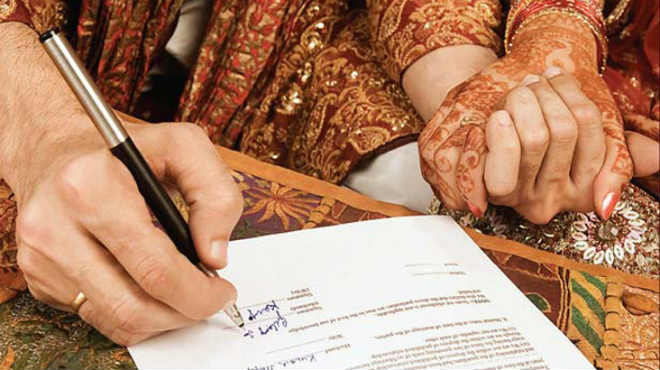In a legal words, Marriage means “the legal union of two persons in a relationship recognized by law”. All females of the age of 18 years or above and all males of the age of 21 years or above can marry according to their wish by choosing the Court Marriage procedure. Age old concept of marrying within one’s own caste is no longer in practise and with the advent of the 21st century, people of all caste, creed and religion are marrying each other thereby ending the caste system in India.

So with this comes that when any Hindu, Buddhist, Sikh and Jain used to marry they were covered under the Hindu Marriage Act. Other religions follow their personal laws for marriage. But there was a dispute that when a person marries another person not belonging to the above four categories or person of another faith or Indian person residing in a foreign country, then what will be the procedure to marry and under which law can they marry so that the marriage is legally recognized. This led to the passing of the Special Marriage Act, 1954.
The Special Marriage Act, 1954 was enacted to provide for a special form of marriage for the people of India and all Indian nationals in foreign countries, irrespective of the religion or faith followed by either party. Marriages solemnized under the Special Marriage Act are not governed by personal laws.
100+ Famous Legal Law Terms: Definition and Meaning
Difference between Special Marriage and Marriage under Hindu Marriage Act
The Hindu Marriage Act is applicable only to the Hindus, whereas the Special Marriage Act is applicable to all citizens of India. Both the parties have to appear before the Registrar along with their parents or guardians or other witnesses within one month from the date of marriage.
- The Special Marriage Act, 1954 has 3 major objectives:-
- To provide a special form of marriage in certain cases,
- to provide for registration of certain marriages and,
- to provide for divorce.
Applicability
The Act is applicable to the below mentioned persons:-
- Any person, irrespective of religion.
- Hindus, Muslims, Buddhists, Jains, Sikhs, Christians, Parsis, or Jews can also perform marriage under the Special Marriage Act, 1954.
- Inter-religion marriages are performed under this Act.
- Applicable to the entire territory of India and extends to intending spouses who are both Indian nationals living abroad.
- Indian national living abroad
Requirements for Marriage under the Act
- Since marriage performed under the Special Marriage Act, 1954 is a civil contract, there need be no rites or ceremonial requirements.
- Neither party has a spouse living;
- Neither party is incapable of giving a valid consent to it in consequence of unsoundness of mind; or though capable of giving a valid consent, has been suffering from mental disorder of such a kind or to such an extent as to be unfit for marriage and the procreation of children; or has been subject to recurrent attacks of insanity
- Male has completed the age of twenty-one years and the female the age of eighteen years;
- Parties are not within the degrees of prohibited relationship except in cases where the custom allows
Notice of Intended Marriage
When a marriage is intended to be solemnized under this Act, the parties to the marriage shall give notice thereof in writing in the form specified in the Second Schedule to the Marriage Officer of the district in which at least one of the parties to the marriage has resided for a period of not less than thirty days immediately preceding the date on which such notice is given.
Marriage Notice Book and publication
- The Marriage Officer shall keep all notices given under section 5 with the records of his office and shall also forthwith enter a true copy of every such notice in a book prescribed for that purpose, to be called the Marriage Notice Book, and such book shall be open for inspection at all reasonable times, without fee, by any person desirous of inspecting the same.
- The Marriage Officer shall cause every such notice to be published by affixing a copy thereof to some conspicuous place in his office.
- Where either of the parties to an intended marriage is not permanently residing within the local limits of the district of the Marriage Officer to whom the notice has been given under section 5, the Marriage Officer shall also cause a copy of such notice to be transmitted to the Marriage Officer of the district within whose limits such party is permanently residing, and that Marriage Officer shall thereupon cause a copy thereof to be affixed to some conspicuous place in his office.
Objection to marriage
- Any person may, before the expiration of thirty days from the date on which any such notice has been published under sub-section (2) of section 6, object to the marriage on the ground that it would contravene one or more of the conditions specified in section 4.
- After the expiration of thirty days from the date on which notice of an intended marriage has been published under sub-section (2) of section 6, the marriage may be solemnized, unless it has been previously objected to under sub-section (1).
- The nature of the objection shall be recorded in writing by the Marriage Officer in the Marriage Notice Book, be read over and explained if necessary, to the person making the objection and shall be signed by him or on his behalf.
Procedure on receipt of the objection
- If an objection is made under section 7 to an intended marriage, the Marriage Officer shall not solemnize the marriage until he has inquired into the matter of the objection and is satisfied that it ought not to prevent the solemnization of the marriage or the objection is withdrawn by the person making it; but the Marriage Officer shall not take more than thirty days from the date of the objection for the purpose of inquiring into the matter of the objection and arriving at a decision.
- If the Marriage Officer upholds the objection and refuses to solemnize the marriage, either party to the intended marriage may, within a period of thirty days from the date of such refusal, prefer an appeal to the district court within the local limits of whose jurisdiction the Marriage Officer has in his office, and the decision of the district court on such appeal shall be final, and the Marriage Officer shall act in conformity with the decision of the court.
Declaration by parties and witnesses
Before the marriage is solemnized the parties and three witnesses shall, in the presence of the Marriage Officer, sign a declaration in the form specified in the Third Schedule to this Act, and the declaration shall be countersigned by the Marriage Officer.
Place and form of solemnization
- The marriage may be solemnized at the office of the Marriage Officer, or at such other place within a reasonable distance therefrom as the parties may desire, and upon such conditions and the payment of such additional fees as may be prescribed.
- The marriage may be solemnized in any form which the parties may choose to adopt: Provided that it shall not be complete and binding on the parties unless each party says to the other in the presence of the Marriage Officer and the three witnesses and in any language understood by the parties,—“I, (A), take the (B), to be my lawful wife (or husband).”
Certificate of marriage
- After solemnization of marriage, Marriage Officer shall enter a certificate thereof in the form specified in a book to be kept by him for that purpose and to be called the Marriage Certificate Book and such certificate shall be signed by the parties to the marriage and the three witnesses
- On a certificate being entered in the Marriage Certificate Book by the Marriage Officer, the Certificate shall be deemed to be conclusive evidence of the fact that a marriage under this Act has been solemnized and that all formalities respecting the signatures of witnesses have been complied with.
New notice when marriage is not solemnized within three months
Whenever a marriage is not solemnized within three calendar months from the date on which notice thereof has been given to the Marriage Officer as required by section 5, the notice and all other proceedings arising therefrom shall be deemed to have lapsed, and no Marriage Officer shall solemnize the marriage until a new notice has been given in the manner laid down in this Act.
Court Marriage
In a Court Marriage, an oath ceremony is performed according to Special Marriage Act-1954 before the Registrar of Marriage in the presence of three witnesses. Thereafter a court marriage certificate is issued directly by the Registrar of Marriage appointed by the Govt. of India.

